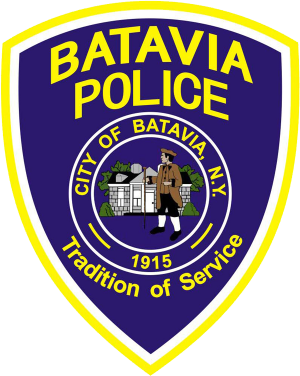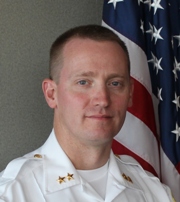Batavia Police to civilians: think and act quickly to survive
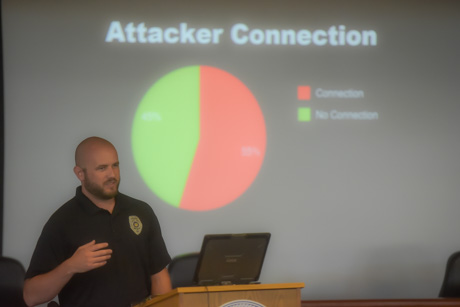
Those who cannot remember the past are condemned to repeat it.
That’s a popular quote with a ring of cliche, but a truth nonetheless that was center to Batavia Police Department’s active shooter training Thursday evening.
And for nearly three hours, Officer Arick Fleming and Detective Steve Cronmiller not only reviewed the history of events — devastating as they were — but discussed how lessons can be gleaned from each scenario. Civilian Response to Active Shooter Events, or CRASE, training was conducted by the police department as a way to better equip ordinary citizens with the knowledge to survive a possible future attack.
While some scenarios illustrated the surprise element of an attack and how it can paralyze people with fear, many others contained gems of insight into how survival really comes down to each individual.
Three key words to keep in mind are denial, deliberation and decisive, as each one will become an action taken by people caught in a surprise assault or tragic event, Fleming said. He asked the group of about 25 attendees how long they might have before emergency responders arrive on scene. Answer: Three minutes. While that isn’t a whole lot of time, it’s three minutes that can mean life or death for the person that hesitates to act in the face of a horrific situation, he said.
Denial: Not acknowledging that something might be happening and ignoring possible warning signs. He gave the scenario of hearing a bang and dismissing it as a car backfiring. Or, as shown in some actual video footage, not reacting when seeing flames on the other side of a building or when an angry, armed man disrupts a government meeting. Most people remained where they were as if gripped with fright or ignorance that something tragic was about to happen.
Deliberation: Assessing a situation for what is actually happening and what are some possible actions to take.
Decisive: Choosing to act in some way, whether it is to flee the situation, find a hiding place or actively combat the danger (a gunman or fire, for example).
“The ones who can make better, quicker decisions are the ones to survive,” Fleming said.
All too often, people look for the lead when in a crowd, he said, instead of acting upon their own instincts. Another video, in which actors lay on the ground acting ill, demonstrated how group-minded individuals can be, as one by one, passersby ignored the person on the ground. In one experiment, 34 people walked by in the first 20 minutes without any acknowledgment of the situation.
The brain’s response to stress …
There is a response to stress, Fleming said, that involves the “lizard brain,” in which a person will either fight, flee or freeze. Their brains may lock up and focus only on one solution — one way out of a burning building, for example.
Yet another video of an actual fire at a nightclub showed a crowd of people seemingly oblivious to a fire that had erupted and was visible. They remained in that group-minded mentality that, since no one else was moving, convinced them it must be the right thing to do. And when it became a mad rush out of the building, people flocked to one main hallway. They became wedged against each other unable to get out. More than 30 people died in that hallway, while several others perished at other points within the building due to not acting immediately, Cronmiller said.
Another interesting but tragic lesson was that nobody even thought to use an alternative exit within the club, he said. Caught up in panic and a gradual thawing of shock, folks just made a mad dash by following everyone else.
“If just one person had thought of breaking the plate glass windows, they could’ve gotten out,” he said, adding that if a building has a kitchen, there is always an exit door there.
A taped interview with a surviving teacher from Sandy Hook Elementary School in Connecticut proved that there are options to take in order to survive. She hid 15 children in a small bathroom and hushed them throughout the time period a gunman ransacked the school and took 26 lives. Even when police finally came to the door, she wouldn’t let them in. Fleming agreed with that choice.
“I wouldn’t open the door for police if I didn’t believe it; if I wasn’t 100 percent sure, I wouldn’t open the door,” he said.
Law enforcement would be able to obtain keys or otherwise find a way into that bathroom, he said. For those who do choose to hide in a room, use whatever is available to barricade the door, he said, from a doorstop to desks and chairs.
A physical response ...
When it comes to fighting off an attacker, the same advice applies: use whatever is handy. Attendees suggested a water bottle, fire extinguishers, chairs and the U.S. flag in council chambers. Being the victim of an attack should make you mad, he said.
“Use that anger. The more things we can throw at his face, that’s going to mess him up,” Fleming said. “You’re buying us time. What you do matters; we need to make it through those first three minutes.”
Philosopher George Santayana seemed to have it right: don’t forget history and don’t repeat the unfortunate mistakes of others. Fleming and Cronmiller wanted everyone to learn from the past and survive a catastrophic event.
The recent attack by a gunman in Erie County prompted Lynda Kelso to attend and obtain those lessons, she said.
“The attack in Buffalo really hit close to home. I saw an opportunity to educate myself a little more. I have one kid in every school, and I’m a stay-at-home mom. I can be available to help,” she said. “If I can learn even one thing to help … I’ll be better equipped should something happen here in Batavia. I would be the one to react; if I can help, I can help.”
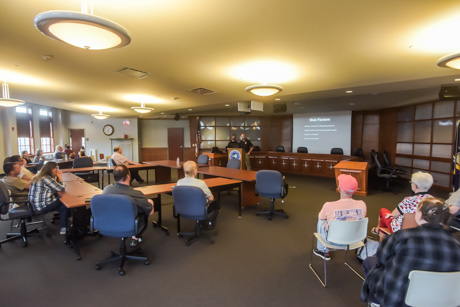
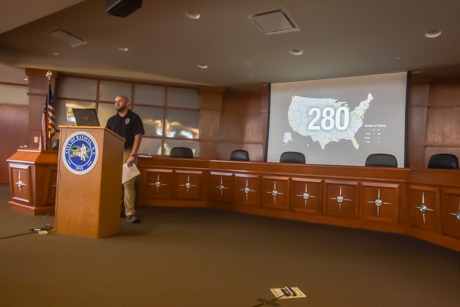
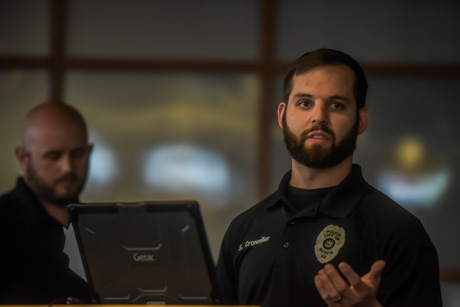
Top photo: Batavia Police Officer Arick Fleming talks about active shooters during a civilian training Thursday at City Hall. Above, Officer Fleming and Detective Steve Cronmiller conduct the training as part of the department's Civilian Response to Active Shooter Events education. Photos by Howard Owens.

